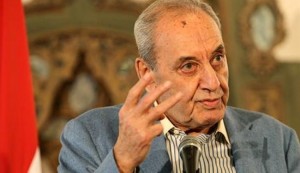 BEIRUT: Speaker Nabih Berri called on Gulf countries to play a mediating role between Iran and Saudi Arabia and encourage rapprochement, as he left Kuwait to continue his tour of the region in Tehran Monday.
BEIRUT: Speaker Nabih Berri called on Gulf countries to play a mediating role between Iran and Saudi Arabia and encourage rapprochement, as he left Kuwait to continue his tour of the region in Tehran Monday.
“I asked the Kuwaiti emir to mediate between Iran and the Kingdom of Saudi Arabia, and he reassured me he would do everything possible to bring their points of view together,” Berri told Al-Rai, a Kuwaiti newspaper, in an interview to be published Tuesday.
Prior to his departure, Berri said he considered strengthening the Army an urgent issue for Lebanon. “Today, I consider strengthening the Lebanese Army a national priority,” he said.
“Lebanon is about to turn into a [new] front line in the Syrian [war], that is already plaguing Tripoli, Hermel and Akkar,” Berri said during a dinner held Sunday by the Lebanese ambassador in his honor.
“The truth is that all of Lebanon is a target – its Army, its resistance, its regions, its capital and its [southern] suburbs – and not just political figures,” he added.
Lebanon continues to feel the repercussions of the conflict in Syria, with recurrent armed clashes in the northern city of Tripoli between supporters and opponents of Syrian President Bashar Assad.
Border regions in Akkar, in the north, and Arsal, in the northeast, have also come under repeated Syrian bombardment since the uprising began in March 2011.
The southern suburbs of Beirut and the northeastern town of Hermel, areas where support for Hezbollah runs high, have also been the scene of recent car bombings linked to the Syria crisis.
Berri assured Lebanese living in Kuwait that Lebanon “will not fall,” despite the threat of terrorism.
He stressed that Lebanon would not remain “neutral” in the face of Israeli attacks, and vowed to continue supporting the aspirations of the Palestinian people.
“I support an Arab Lebanon which favors a political solution in Syria and agreement among Syrians to improve the regime,” he said. “[I support] an Arab Lebanon that favors a united Iraq and Egypt.”
He said Lebanon should not only be strong in its “resistance” along the national borders, but should also work toward resolving the socioeconomic crisis, and holding timely presidential and parliamentary elections based on a new electoral law.
Upon his arrival in Iran, Berri issued a statement calling for the presidential election to be held on time “before May 25, since the constitutional period for holding the election is between March 25 and May 25.”
“In a country like Lebanon, there must be an agreement, and when I said that I would not discuss this issue before March 25, it was not because I want to postpone it, God forbid, but on the contrary, we want to hold a presidential poll but we need to set the foundations first and get the political parties together to secure quorum,” so constitutional deadlines are not broached, he said in the statement.
On the advisories warning Kuwaitis and other Gulf nationals against travel to Lebanon, Berri said the rationale behind them was unfair: “Security incidents, demonstrations and road blockages can happen in any European and Gulf state or any country in the world.”
“This [advisory] which was implemented by the Gulf states is not in the interests of Lebanon or Arabs in general. If Kuwaiti, Saudi or UAE nationals are subject to any kind of danger I wouldn’t say this, but when the incidents in Lebanon are due to external elements, which could occur in any country, then I must say these words and insist on my point of view.”
Gulf states, including Kuwait, have advised their citizens to avoid all travel to Lebanon and urged those in the country to leave given the tense security situation.
By The Daily Star
The Iran Project is not responsible for the content of quoted articles.

 QR code
QR code